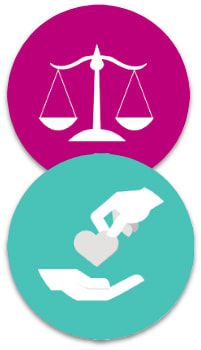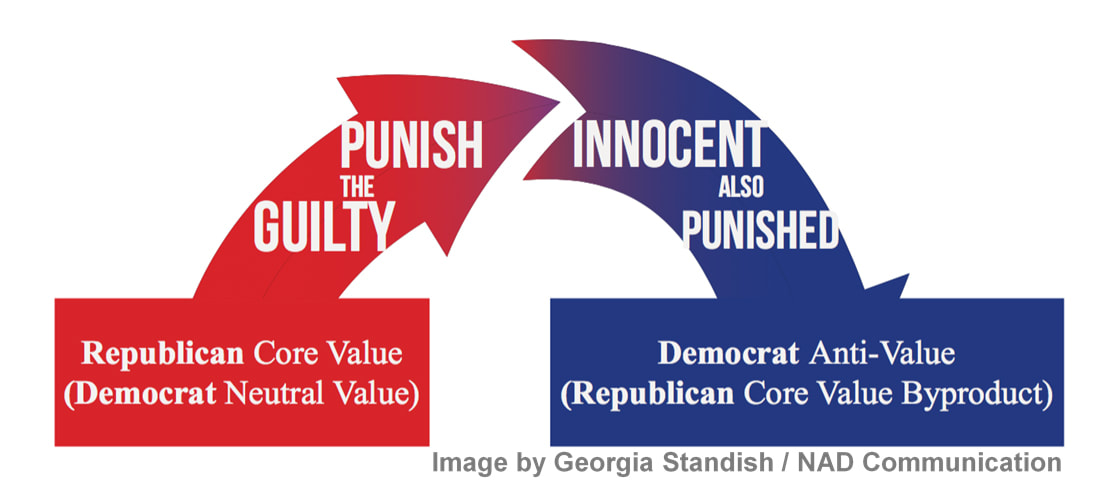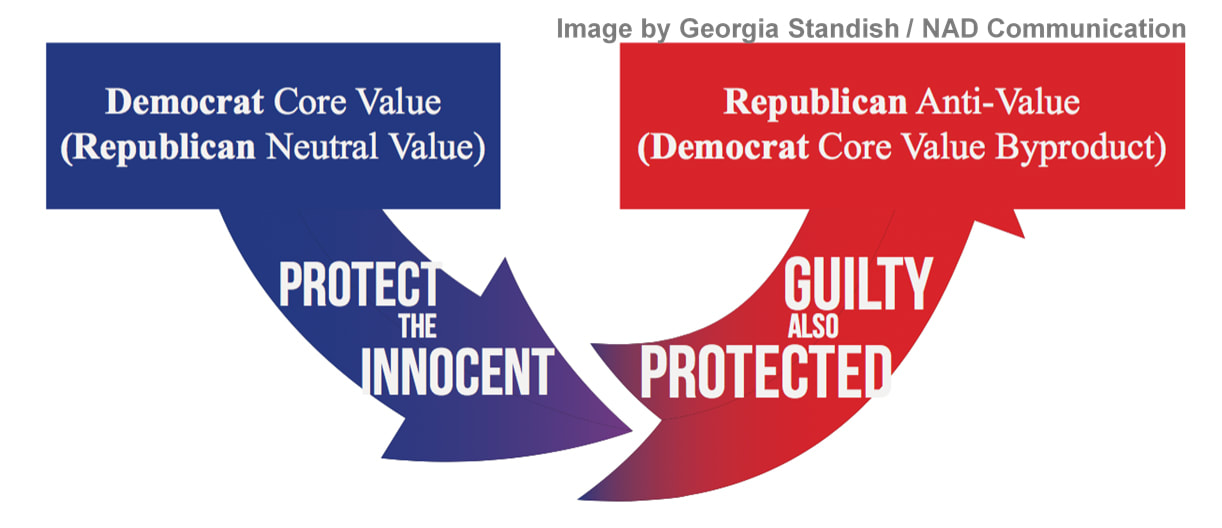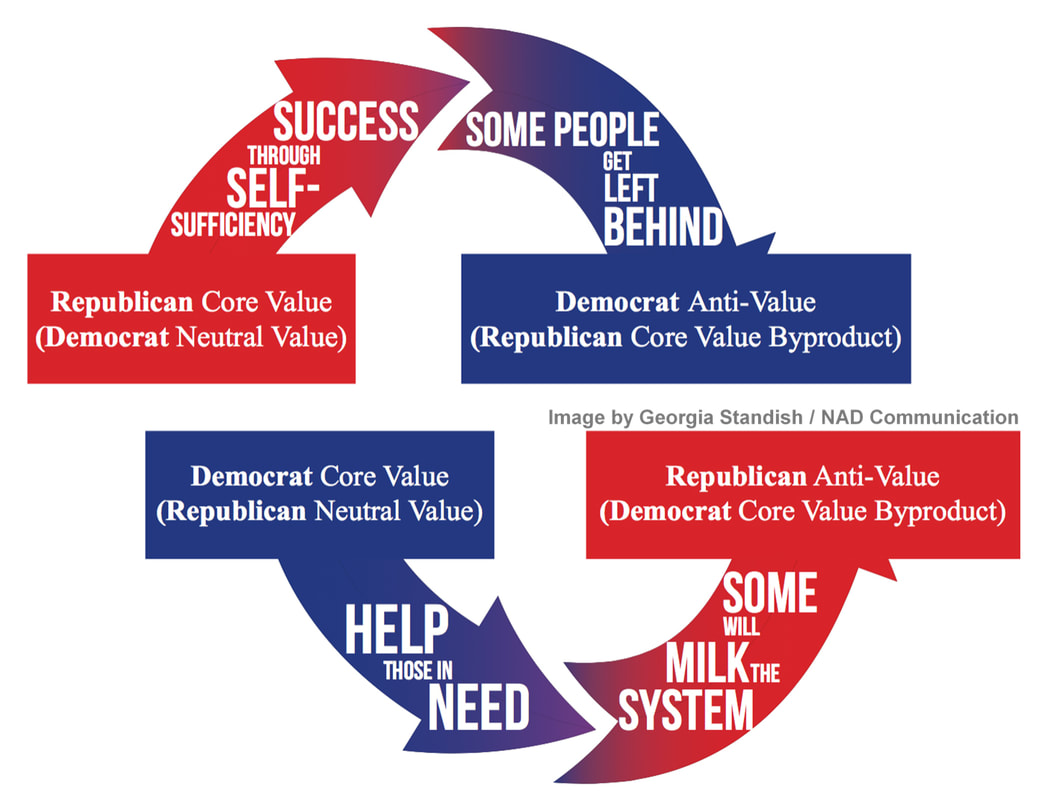Paul Hopkins Director of Social Media + Big Data, North American Division Part 3 in our series on "Politics, Race & Religion." Bureaucratic activist and/or people with strong political convictions loosely throw a phrase like “American Values” about when the honest statement is, “The values of the party / group I identify with or represent.” Rhetoric feels good. I get that. It’s a comfortable place to pitch your tent, mingle with like minded people, laugh at the ludicrous extremes of the other side. But it’s still only half of the pie. For example, special interest groups exist to give voices to the values of the constituents and parties they represent. They are both beloved and hated universally for being singularly focused and narrow minded. The National Rifle Association (NRA) will tell you that it lobbies on behalf of people who care about its “second amendment right to bear arms.” For people to sustain their constitutional right to carry weapons such as handguns for protection, or shotguns and rifles to hunt. All true. What they don’t want to talk about is gun registration, background checks to ferret out criminals and the mentally unstable, or banning assault-style weapons or high-capacity ammunition clips that are the hallmark of shooting massacres. Labor unions will tell you that they provide better working conditions, higher wages and benefits, job protection and the influence of a collective voice. All true. What they won’t tell you is that they also protect unproductive employees, cause prices for services and fees to increase for employers, which are often passed on to consumers, and contribute to environments that are as combative as they are cooperative. Politicians, special interest for both sides and voters on the left and right do believe in and represent American values, but speak completely different languages. Their framework of value is biased, and the heart of why the right and the left are so far from one another may come down to where each party, and individuals within those parties, reside on the continuum of ethical values versus moral values. These words are not to be confused and are not interchangeable, nor does it mean that people have to be one or the other. People can be both, or neither, but have the proclivity to let ethics or morals define a greater part of their lives and beliefs. So what is the difference? Ethics is a fundamentally utilitarian belief that good and bad choices should be based on outcomes rather than on the actions needed to get there (outcomes > intentions). Ethics also refers to rules that groups provide. This stands in contrast with the moral reasoning of the Judeo-Christian tradition that there should be an objective standard for right and wrong (intentions > outcomes), and an individual’s own principles regarding right and wrong should guide that reasoning. To speak to both points, the means and the ends should be morally and ethically permissible, but they are not. Ian Welsh, the blogger, says the best short definition he’s heard is “Morals are how you treat people you know. Ethics are how you treat people you don’t know.” A better understanding of ethics based and moral based upbringings may explain why many foster these values throughout their lives. From an early age, Republican homes focus on strict parenting that creates self-reliant children who are told that “the world owes you nothing.” This atmosphere of rewards and punishment is thought to build character from hard work and discipline. The young are taught to believe that life is difficult with tangible evil, and it rewards none with participation trophies. Right is right, and wrong is wrong. Preserve the good things in life, and build your community on the moral-based principles of “Do unto others…,” weakness of mind, body and character and the tolerance of it is immoral, because it implies being unable to stand up to evil. Punishment is required to balance the moral books: If you do wrong, you must suffer a negative consequence. Self-reliance is key to all good accomplishments. Democratic homes by contrast have an atmospheric presence of protection and communication. Empathy and empowerment help to ensure growth rather than punitive fear. In the Nurturant Parent family, it is assumed that the world is basically good…or could be with oversight. And, however difficult the world may be at present, it can be made better, and it is our responsibility to help to make it better. Correspondingly, children are born good, and parents can make them better, and it is their responsibility to do so by providing safe spaces for them to maneuver and grow. It’s no wonder we see the world so differently. But would you be surprised if I told you that it’s not what one believes that is the only or the greatest source of friction: It is the byproducts of our ethical and moral values. We can theoretically agree that many of the same things are good or bad. For instance, let’s start with crime. The Public Religion Research Institute, which is an American nonprofit, nonpartisan research and education organization that conducts public opinion polls on a variety of different topics, says that 57% of Democrats say crime is a critical issue compared to 53% of Republicans (The largest differences between the priorities of Democrats and Republicans are on the issues of economic inequality, cost of education and climate change ). It’s an area where both showed slightly higher-than-average levels of concern. It’s a difference of 4%, but it may as well be 400% because both view crime through vastly different lenses. Democrats focus on the idea that:
Republicans, by contrast, focus on the idea that:
And this is the heart of our conundrum. Alone, each statement is something with which you may or may not agree, but when paired together with its core value counterpart, it becomes toxic. Each is an example of what I’d like to call core value byproducts. Let’s look at the following image as an example…with definitions. Core Values are things or ideas that are held in the highest regard by an individual or a group. Neutral values are things or ideas that may or may not be valued by individuals or groups. Core anti-values are things or ideas that are despised by an individual or group. Core Value byproducts are fundamental values from one group that contribute to byproducts that clash with the core fundamental values of another group. With this in mind, let’s revisit the values… A Core Republican Value = Punish the guilty. Most Republicans believe that punishment of the guilty is not only desirable but necessary. That is a core value focal point…but doesn’t tell the whole story. In today’s society, many innocent people have also been wrongly convicted. There is also a disparity in criminal sentencing, which has ruined lives and caused justifiable outrage in communities most affected by these actions. The National Academy of Sciences has used a survival analysis model to determine that 4.1% of defendants sentenced to death would be exonerated if they remained on the sentence indefinitely.(#5) The actual rate isn’t as high because many defendants plead out death sentences for life sentences. That speaks as much to fear of death as it does to a person’s guilt. It also makes one wonder how many innocents are serving life sentences. What it the effect on these men and women, and their families? The Ohio State University has estimated that about 10,000 are wrongly convicted of serious crimes each year. (#6) That’s alarming. As a visual comparable, according to the 2002 U.S. Census of Governments, there were more than 31,000 local general-purpose governments with fewer than 10,000 residents in the United States. The “wrongly convicted rates” could be likened to gathering up entire communities and then bussing them off to be locked away. That’s frightening, and more so when you think a community of that size is gathered up like that on a yearly basis. On the flip side… A Core Democratic Value = Protect the innocent. If you are a Democrat, one’s plight to protect innocent people may mean that you are sometimes willing to turn a blind eye to major and petty crime if it “balances the books.” But how harmful could that be? Criminals are often repeat offenders, so everyone that avoids punishment is more likely to steal, assault or murder someone again than not. By keeping offenders free, everyone is put at higher risk. And those that are incarcerated also pose a risk when released. A study from the Bureau of Justice showed that the recidivism rate of criminals released from 2005-2010 within a 30 state sampling was 68% within three years, and 77% within five years. (#7) Iowa State University did a study that calculated the societal cost of the five major crimes of: murder, rape, armed robbery, aggravated assault and burglary. Societal costs included victim costs, criminal justice system costs, lost productivity estimates for both the victim and the criminal, and estimates on the public's resulting willingness to pay to prevent future violence. The numbers are mind boggling. Murder $17.25 million; rape $449 thousand; armed robbery $336 thousand; aggravated assault $145 thousand; and burglary $41 thousand. (#8) These are facts. So why is it so hard to acknowledge that both criminality, and wrongful incarceration, are things that we should both be very concerned with and work toward? The Psychological Bulletin, a journal published by the American Psychological Association, analyzed data from 91 studies involving nearly 8,000 participants. University of Illinois psychology professor Dolores Aibarracin, who led the study, noted some interesting findings.
It seems sinful to be so focused on our own values, that we are unwilling to expose ourselves to other ideas, or to debase the views of others without really understanding them. I am struck by the clarity of God’s word about crime, punishment and innocence. “Do not pervert justice; do not show partiality to the poor or favoritism to the great, but judge your neighbor fairly.” Leviticus 19:15 “For I the LORD, love justice; I hate robbery and wrong doing. In my greatness I will reward my people and make a covenant with them.” Isaiah 6:8 “Whoever says to the guilty, “You are innocent,” will be cursed by peoples and denounced by nations. But it will go well with those who convict the guilty, and rich blessing will come on them.” Proverbs 24:24-25 “Learn to do right; seek justice. Defend the oppressed. Take up the cause of the fatherless; plead the case of the widow.” Isaiah 1:17 “Punish crime and defend the innocent. For the wrongdoer will be paid back for the wrong he has done, and there is no partiality.” Colossians 3:25 “So speak and so act as those who are to be judged under the law of liberty. For judgment is without mercy to one who has shown no mercy. Mercy triumphs over judgment.” James 2:12-13 Punish the guilty. Bestow mercy. Show no favoritism. Defend the innocent. It seems pretty clear. Let’s look at two more core values with their charts. Again, the values are largely noble, but the value byproducts go against the core being of those that don’t share your values…and again speaks to the ethical versus moral worldview issues that we have. A Core Democratic Value = Help the Disadvantaged A Core Republican Value = Reward Hard Work Do you see the endless cycle? Again, two noble values. And again, value byproducts that essentially render our agreement on the initial values as moot points. I recognize your value. I may even feel positive about your value. But the value byproduct of your core value is so offensive to my being, that at best, I’ll ignore your value, and at worst, I’m willing to destroy any chance you’ll have at seeing it come to fruition if I know my core value is being ignored and trampled upon. (#1) https://www.census.gov/prod/2013pubs/p20-568.pdf (#2)http://www.businessinsider.com/exit-polls-who-voted-for-trump-clinton-2016-11/#more-women-voted-for-clinton-as-expected-but-trump-still-got-42-of-female-votes-1 (#3) https://braindecoder.com/post/politics-neuroscience-1282982492# (#4)http://www.complex.com/pop-culture/2014/11/a-history-of-frenemyship-of-jon-stewart-and-bill-oreilly/ (#5) http://www.pnas.org/content/111/20/7230 & http://phenomena.nationalgeographic.com/2014/04/28/how-many-people-are-wrongly-convicted-researchers-do-the-math/ (#6) https://researchnews.osu.edu/archive/ronhuff.htm (#7) https://www.bjs.gov/index.cfm?ty=pbdetail&iid=4986 (#8) http://www.news.iastate.edu/news/2010/sep/costofcrime
Monte Sahlin
9/8/2017 08:18:29 am
Much of the talk about "values" is simply propaganda; a way to manipulate people into supporting a political cause or candidate. Often it is entirely dishonest or appeals to motives such as greed and fear that followers of Jesus should never encourage. Many of the actual values that motivate Americans are simply expressions of selfishness. 5/4/2023 02:52:39 am
Thanks for sharing those references. Will gonna check them out! Comments are closed.
|
Archives
August 2020
Categories
All
|
- Home
- BLOG
-
RESOURCES
-
RESOURCE MENU
>
- ADVENTIST IDENTITY GUIDELINES
- BIG DATA RESOURCES
- BRANDING, IMAGE & DESIGN RESOURCES
- CHURCH/MINISTRY SPECIFIC RESOURCES
- COPYRIGHT & TRADEMARK BASICS
- COURSES
- EMAIL RESOURCES
- GUIDANCE FOR HIRING SOCIAL MEDIA POSITIONS
- PODCASTS
- REPORTS & CASE STUDIES
- SOCIAL MEDIA RESOURCES
- (SOCIAL) VIDEO RESOURCES >
- TEXTING 4 CHURCHES
- TRACKING & ANALTYICS
- WATCH VIDEOS & TUTORIALS
- WEBSITE TIPS
- SOCIAL MEDIA GUIDELINES
-
RESOURCE MENU
>
- SEO
- Digital Discipleship & Evangelism
- COVID-19 RESOURCES
- eNEWSLETTER





 RSS Feed
RSS Feed